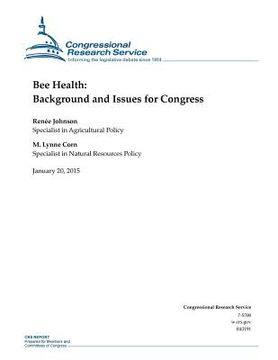Reseña del libro "Bee Health: Background and Issues for Congress (en Inglés)"
Bees, both commercially managed honey bees and wild bees, play an important role in global food production. In the United States alone, the value of insect pollination to U.S. agricultural production is estimated at $16 billion annually, of which about three-fourths is attributable to honey bees. Worldwide, the contribution of bees and other insects to global crop production for human food is valued at about $190 billion. Given the importance of honey bees and other bee species to food production, many have expressed concern about whether a "pollinator crisis" has been occurring in recent decades. Over the past few decades there has been heightened concern about the plight of honey bees as well as other bee and pollinator species. Although honey bee colony losses due to bee pests, parasites, and disease are not uncommon, there is the perception that bee health has been declining at a faster rate both in the United States and globally in recent years. This situation gained increased attention in 2006 as some commercial beekeepers began reporting sharp declines in their honey bee colonies. Because of the severity and unusual circumstances of these colony declines, scientists named this phenomenon colony collapse disorder (CCD). Since then, honey bee colonies have continued to dwindle each year, for reasons not solely attributable to CCD. The U.S. Department of Agriculture (USDA) reports that CCD may not be the only or even the major cause of bee colony losses in recent years. In the United States, USDA estimates of overwinter colony losses from all causes have averaged more than 30% annually since 2006. To date, the precise reasons for bee colony losses are not yet known. Reasons cited for bee declines include a wide range of possible factors thought to be affecting pollinator species. These include bee pests and disease, diet and nutrition, genetics, habitat loss and other environmental stressors, agricultural pesticides, and beekeeping management issues, as well as the possibility that bees are being affected by cumulative, multiple exposures and/or the interactive effects of several of these factors.

